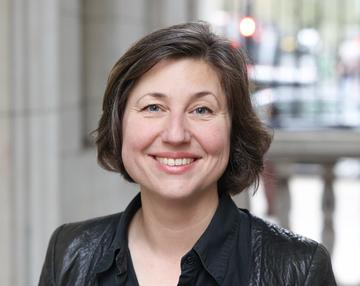
Professor Alice Rio
The Faculty of History and All Souls College are pleased to announce that Professor Alice Rio has been appointed as the next Chichele Professor of Medieval History starting from Autumn 2025.
About Alice Rio
I am a historian of early medieval Europe. I was born and raised in Paris, but all of my university education was in the UK. I did my PhD at King’s College London, and then was a JRF at New College, Oxford, and then a College Lecturer at Sidney Sussex, Cambridge, before moving back to King’s as a lecturer. I was made a professor there in 2018. I am currently co-editor of the journal Past & Present.
My initial interest was in legal culture: what makes people choose to express what they think they owe to each other in terms of legal obligations. My first book, Legal Practice and the Written Word in the Early Middle Ages (Cambridge, 2009), was about Frankish notaries’ handbooks, which give a rare glimpse into a lively, eclectic textual community, responding to the demand of clients rather than top-down imposition. My second book, Slavery After Rome, c. 500-1100 (Oxford, 2017), was a comparative study of slavery in the centuries following the fall of the Roman empire. My goal was to move away from the “transition from slavery to serfdom” narrative which dominated the literature. The normal approach had been to look in sources for Latin words for “slave” and ask, did the word mean someone like a Roman slave, or more like a medieval serf. But nobody just was a slave, whose living conditions could then help to define the condition: what you find instead are people being claimed and labelled as slaves by other, more powerful people, for many different reasons and purposes. The situations covered by words for “slave” look contradictory not because these words were weaker or no longer understood and would soon need to be replaced by a new vocabulary of serfdom, but because these claims were being used to do more, and stranger, things. Later I wrote a very short book (Slaving and the Funding of Elite Status in Early Medieval Europe (ca. 800-1000 AD) (Bonn, 2024)) to discuss the very long-distance slave trade which in the ninth and tenth centuries linked Ireland and Iceland to Iraq and Afghanistan, which is now becoming much better understood thanks to some very stimulating recent research.
I am now working on a trade book: a narrative history of early medieval Europe through the experiences of a handful of women who travelled from one European region to another - using the most expansive possible definition of “Europe”, from Iceland to the Caucasus and from Iberia to the Baltic. Taking the point of view of women who were bearers of a minority culture seemed a good way to write a narrative of this period that would avoid both Great Men and exceptionalist national trajectories.
The process of writing that book has made me think much harder about foreign women, and foreign mothers especially, and about the household as a setting for the transmission or non-transmission of culture. Migrant women can be important in transmitting their culture, or a mixed culture, to their children, but they can also be made not to be. We’re used to thinking of the household as somewhere where fundamental power relationships are embodied and enacted. I think foreign women add a further important dimension to this, and that this actually tells us quite a lot about a society – both in the early middle ages and today. I would like to work on this for my next main project, and I’m delighted that I will get to do it in Oxford.